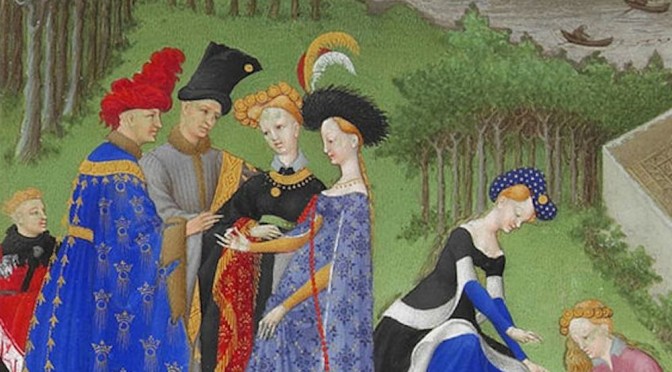In 1350, the whole of Europe was ruled by an interconnecting aristocracy of Dukes, Comtes and Viscomtes. They assumed themselves to be “Noble”. They believed that they all belonged to a special group which gave them authority over other lesser mortals. Ximene was educated to believe that this tradition was an absolute fact.
They promoted this belief so successfully that those who owed allegiance to them, rarely questioned its validity.
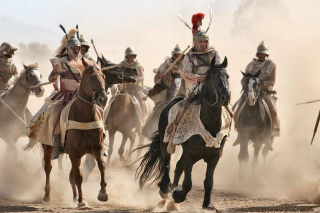 The title (French and Occitan Comte, Spanish Conde, Italian Conte, Earls in England) originates in the term “companion” used to distinguish the personal guard of Alexander the Great. The leaders of Alexander’s army were also his personal bodyguard.
The title (French and Occitan Comte, Spanish Conde, Italian Conte, Earls in England) originates in the term “companion” used to distinguish the personal guard of Alexander the Great. The leaders of Alexander’s army were also his personal bodyguard.
In the Roman Empire it originally had a similar meaning, “Companion of The Emperor”, but increasingly it came to mean “Appointee of the Emperor, acting on the Emporer’s behalf”. Those appointed to this role became known as “Nobilis Comites” which literally translates as the “well known”, or perhaps “famous” Counts.
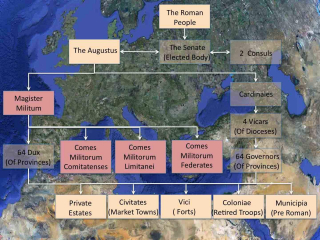 The strategy being used depended totally on local quick decision making. The Comitas were detached from the Dux and given the authority to command not only their troops but civil and other military personnel. Whole districts were put under their command. The organisation created occasional conflict Comitas and Magister Milatorum.
For all this to work the district civil administration had to understand the role of the Comitas and the role the civil population must play. The Comitas became increasingly independent and self reliant in the area they controlled.the claim to be “Noble”was often backed up by geneologies which showed that individual counts were descended from Julius Caesar, Cleopatra or even Jesus himself. Many Counts did have genealogical roots in the upper levels of the Roman Empire. There was a very good reason for this as the origin of the Counts lay in the management structure of the Roman empire and specifically in the appointments made by the later emperors.The Nobiles Comites had their origins in the structure of the Empire of that time. They were middle level administators and commanders of legions but with the unique status of representing the emperors interests. As the threat of invasion increased The management structure and even the roles themselves were refined, but the net result was that the roles of the Comites were continually strengthened.
The strategy being used depended totally on local quick decision making. The Comitas were detached from the Dux and given the authority to command not only their troops but civil and other military personnel. Whole districts were put under their command. The organisation created occasional conflict Comitas and Magister Milatorum.
For all this to work the district civil administration had to understand the role of the Comitas and the role the civil population must play. The Comitas became increasingly independent and self reliant in the area they controlled.the claim to be “Noble”was often backed up by geneologies which showed that individual counts were descended from Julius Caesar, Cleopatra or even Jesus himself. Many Counts did have genealogical roots in the upper levels of the Roman Empire. There was a very good reason for this as the origin of the Counts lay in the management structure of the Roman empire and specifically in the appointments made by the later emperors.The Nobiles Comites had their origins in the structure of the Empire of that time. They were middle level administators and commanders of legions but with the unique status of representing the emperors interests. As the threat of invasion increased The management structure and even the roles themselves were refined, but the net result was that the roles of the Comites were continually strengthened.
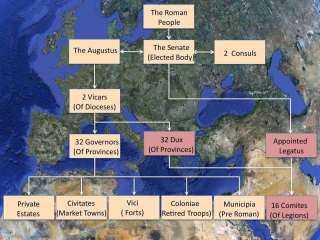 The Roman system of government was complex. In the Roman Empire, the whole objective was to provide wealth for Roman Citizens.
Wealth was not generated by the ownership of land, and although the rich could have great landownings. Most senior officials were forbidden to take part in farming, trade or industry, hence the use of Comes. The way the wealth, generated by the Empire, was distributed to Roman Citizens was by payment for performing public office. Along with payment, all public offices offered the opportunity to take a commission on transactions under the incumbent’s control or even from a specific sphere of influence.
As the empire grew a “Governor” dealing with civil issues and a “Dux” dealing with military issues was appointed in every province. Also in every Province their was a “Comes”, in charge of a legion. The Comes responded to the Dux.
There were hundreds of thousands of Roman Officials. It was not so much an administration as a means of wealth distribution. This did not mean that the officials behaved without self interest. There was a great rebellion in Pannonia and Illyrica in AD 6-9. The leader of the rebellion Bato when questioned about the motivation for the rebellion replied “ You send as guardians of your flocks not Shepherds but Wolves”.
In times of difficulty such as this, the Senate could appoint a “Legatus” who could carry out investigations in any province and most importantly take command of one or more legions.
In emergencies the Senate could appoint, for a limited time a “Dictator” who could make decisions and take action without any reference to the senate. Initially the Augustus was simply a dictator appointed for life.The Roman Empire had it’s shortcomings and injustices but for most of the people in her Empire, Rome provided two hundred years of relative peace.
The Roman system of government was complex. In the Roman Empire, the whole objective was to provide wealth for Roman Citizens.
Wealth was not generated by the ownership of land, and although the rich could have great landownings. Most senior officials were forbidden to take part in farming, trade or industry, hence the use of Comes. The way the wealth, generated by the Empire, was distributed to Roman Citizens was by payment for performing public office. Along with payment, all public offices offered the opportunity to take a commission on transactions under the incumbent’s control or even from a specific sphere of influence.
As the empire grew a “Governor” dealing with civil issues and a “Dux” dealing with military issues was appointed in every province. Also in every Province their was a “Comes”, in charge of a legion. The Comes responded to the Dux.
There were hundreds of thousands of Roman Officials. It was not so much an administration as a means of wealth distribution. This did not mean that the officials behaved without self interest. There was a great rebellion in Pannonia and Illyrica in AD 6-9. The leader of the rebellion Bato when questioned about the motivation for the rebellion replied “ You send as guardians of your flocks not Shepherds but Wolves”.
In times of difficulty such as this, the Senate could appoint a “Legatus” who could carry out investigations in any province and most importantly take command of one or more legions.
In emergencies the Senate could appoint, for a limited time a “Dictator” who could make decisions and take action without any reference to the senate. Initially the Augustus was simply a dictator appointed for life.The Roman Empire had it’s shortcomings and injustices but for most of the people in her Empire, Rome provided two hundred years of relative peace.
There was a good reason for the creation of the role of the Comites.
One of the weaknesses of the Roman Empire was that it had neither a written constitution or statutory laws. Administrators felt free to invent procedures and implement legal decisions to suit themselves. Many of the changes in administration were attempts by the various emperors to improve control. An earlier attempt, when the senate had greater power than it did in the later period, was the use of legates who could go to any part of the empire to enforce the senate’s will on any particular issue.
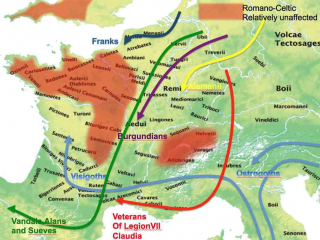 For three generations the peace of the western empire had been disrupted by the “migrations” of the Germanic peoples; Allamanii, Sueves,Vandals, Alans and Visigoths, all trying to escape from the ever increasing threat of the Huns. Then in 461 the Huns themselves had invaded, reaching the gates of Orleans.
For three generations the peace of the western empire had been disrupted by the “migrations” of the Germanic peoples; Allamanii, Sueves,Vandals, Alans and Visigoths, all trying to escape from the ever increasing threat of the Huns. Then in 461 the Huns themselves had invaded, reaching the gates of Orleans.
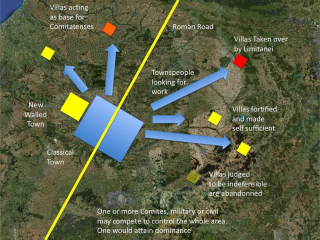 The Huns were defeated, but by that point the populace had become obsessed with defence. Local communities organised accordingly. Those who had led the army which had defeated the Huns had become much in demand initially as consultants to advise on defensive issues but increasingly to recruit skilled mencenaries, take up residence locally and to take command of the local militias.
The Huns were defeated, but by that point the populace had become obsessed with defence. Local communities organised accordingly. Those who had led the army which had defeated the Huns had become much in demand initially as consultants to advise on defensive issues but increasingly to recruit skilled mencenaries, take up residence locally and to take command of the local militias.
These commanders were almost all drawn from the ranks of the Nobilis Comitas. By that stage the Comptes (Counts) were the guardians of warfare technology, specifically the use of cavalry, archery and the skills of fortification and siege. Initially in the service of communities they rapidly moved to impose taxes on those they protected. They used their new wealth to purchase land, and their new power to appropriate land. They became rulers of the districts they had originally been hired to assist. The word “noble” took on a totally different meaning.
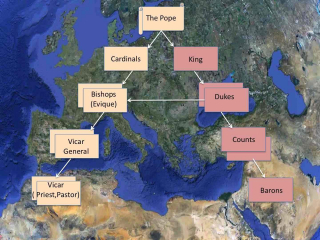 When in AD 476 news filtered through that Romulus Augustus had been deposed and that the senate in Rome had declared that they would be content to be ruled by a single common Emporer from the East, in the towns and on the great estates in Gaul it would not have felt like the end of the Roman Empire. Some would have been in favour of the unification, some against. The majority would had no real interest, wanting only peace and quiet, with hopefully a reduction in the crippling tax burden. By this stage the western roman empire resembled a confederacy. Power had been decentralised into the hands of the Counts, initially as an integral part of the apparatus of the Empire but becoming increasingly independent from central authority.
When in AD 476 news filtered through that Romulus Augustus had been deposed and that the senate in Rome had declared that they would be content to be ruled by a single common Emporer from the East, in the towns and on the great estates in Gaul it would not have felt like the end of the Roman Empire. Some would have been in favour of the unification, some against. The majority would had no real interest, wanting only peace and quiet, with hopefully a reduction in the crippling tax burden. By this stage the western roman empire resembled a confederacy. Power had been decentralised into the hands of the Counts, initially as an integral part of the apparatus of the Empire but becoming increasingly independent from central authority.
Within 20 years an alliance between the Church of Rome and the Franks created a new structure but one which borrowed heavily from the old. Wealthy landowners now became subservient to the Comtes and the feudal system was brought into being. The Counts began to jostle each other as they sought to increase local security by gaining control of important geographical features and they sought support from a higher authority, but which higher authority? The Church of Rome played an important part in stabilising the situation by claiming that they and only they had the right to appoint kings.
 Some counts or more often members of the new “royal” family were appointed as Dukes responsible for co-ordinating the activities of counts in specific geographical area and ensuring that in these areas the Kings wishes were met, thereby imposing on the counts, controls which a generation earlier the counts had imposed themselves on behalf of the Emperor.
Some counts or more often members of the new “royal” family were appointed as Dukes responsible for co-ordinating the activities of counts in specific geographical area and ensuring that in these areas the Kings wishes were met, thereby imposing on the counts, controls which a generation earlier the counts had imposed themselves on behalf of the Emperor.
In the Roman Empire, particularly in the east, there were a large number of client Kings, who ranked below the Comes in the structure of the late empire, which goes a long way to explain the ambivalent attitude of the Comtes to a King, any King’s authority. It also explains Ximene’s unshakable belief that her royal suitors must ultimately bend to her will. In frankia the continual subdivision and redefinition of kingdoms resulted in the Comtes having a high degree of independence.
 Nevertheless the Counts chose to give allegiance to kings because kings were chosen by the Pope to be God’s representative on Earth. A codicil to this acceptance was that Counts regarded Kings as no more than guardians of the Roman faith. The counts were often wealthier and more powerful than the Kings and regarded themselves to be the equal of, or superior to the King.
Nevertheless the Counts chose to give allegiance to kings because kings were chosen by the Pope to be God’s representative on Earth. A codicil to this acceptance was that Counts regarded Kings as no more than guardians of the Roman faith. The counts were often wealthier and more powerful than the Kings and regarded themselves to be the equal of, or superior to the King.
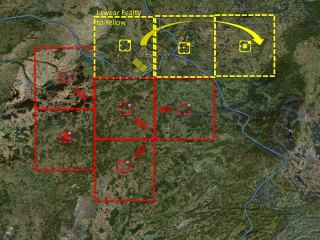 From the beginning of the 12th century the Counts began to appreciate their power . A king could be disenfranchised or a king’s territory diminished by group of counts changing their allegiance and swearing fealty to a different King.
From the beginning of the 12th century the Counts began to appreciate their power . A king could be disenfranchised or a king’s territory diminished by group of counts changing their allegiance and swearing fealty to a different King.
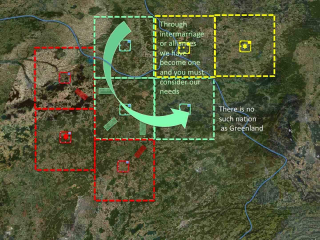 In turn Kings scrambled to prove that they shared the “noble blood’ of an even had a purer strain, hence a growing preoccupation with dynastic marriages to improve their blood lines. Mistresses were taken by Kings for dynastic, not amorous reasons, to prevent prestigious blood lines being available to their competitors.
In turn Kings scrambled to prove that they shared the “noble blood’ of an even had a purer strain, hence a growing preoccupation with dynastic marriages to improve their blood lines. Mistresses were taken by Kings for dynastic, not amorous reasons, to prevent prestigious blood lines being available to their competitors.
